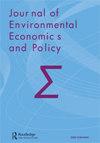七国集团国家财政政策与二氧化碳排放之间的互动:1875–2016
IF 1.2
Q3 ENVIRONMENTAL STUDIES
Journal of Environmental Economics and Policy
Pub Date : 2021-07-06
DOI:10.1080/21606544.2021.1950575
引用次数: 28
摘要
摘要本研究采用频域自举因果关系检验方法,考察了财政政策和经济增长对二氧化碳排放的影响。通过分析G7国家1875年至2016年的长时间序列数据,我们主要旨在研究环境库兹涅茨曲线(EKC)假说的有效性以及财政政策是否会影响环境。从政府支出到二氧化碳排放的因果关系是随时间变化的。然而,除加拿大外,所有国家从经济增长到二氧化碳排放的因果关系都是稳定的,不会随着时间的推移而变化。由于因果关系遵循一致的线,并且不能证实经济增长和环境污染之间的倒U型关系,EKC假说在G7国家不成立,这意味着环境问题不会自动解决。研究结果还表明,财政政策可以在不同的时间点为缓解气候变化做出贡献。本文章由计算机程序翻译,如有差异,请以英文原文为准。
On the interaction between fiscal policy and CO2 emissions in G7 countries: 1875–2016
ABSTRACT This study examines the impact of fiscal policy and economic growth on CO2 emissions employing a bootstrap causality test in the frequency domain. Analysing a long time series of data from 1875 to 2016 for G7 countries, we mainly aim to investigate the validity of the environmental Kuznets curve (EKC) hypothesis and whether fiscal policy affects the environment. The findings of causality from government expenditures to CO2 emissions are time-varying. However, the causality from economic growth to CO2 emissions follows a stable path and does not change over time in all countries except Canada. Since causal relations follow a consistent line and do not confirm an inverted U-shaped relationship between economic growth and environmental pollution, the EKC hypothesis does not hold in the G7 countries, implying that environmental problems are not automatically solved. The results also suggest that fiscal policy can contribute to climate change mitigation at different points in time.
求助全文
通过发布文献求助,成功后即可免费获取论文全文。
去求助
来源期刊

Journal of Environmental Economics and Policy
ENVIRONMENTAL STUDIES-
CiteScore
4.70
自引率
7.70%
发文量
26
 求助内容:
求助内容: 应助结果提醒方式:
应助结果提醒方式:


